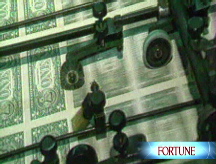Dollar plummets against yen
U.S. currency drops 4% against Japanese currency, but rises to 14-month high against the euro as bailouts continue in Europe.
NEW YORK (CNNMoney.com) -- The dollar continued to rally against European currencies Monday but plummeted more than 4% to hit a 6-month low against the Japanese yen, as the credit crisis spreads around the globe.
The dollar fell as low as 4.8%, or ¥100.23 during Monday trading from ¥105.32 Friday. It was the first time the greenback traded that low since Mar. 31.
By 6:13 p.m. ET, the dollar had recovered slightly, but was still trading down 3.7% against the Japanese currency to ¥101.45.
"The yen typically outperforms other currencies during periods of extreme risk aversion," said Dustin Reid, ABN AMRO senior currency strategist.
Concern about tightening credit markets have affected currency values worldwide.
The euro traded at $1.3491, down 2% from $1.3772 Friday. Earlier Monday, the euro hit $1.3471, the lowest level the currency has seen since Aug. 20, 2007.
The British pound bought $1.7433, down 1.5% from $1.769. At one point Monday, the U.K. currency sank as low as $1.7335, the lowest point the pound has seen since March 13, 2006.
With traditionally strong currencies in free fall, European governments are stepping up their efforts to restore confidence in large financial institutions in order to deal with the tight credit market.
Germany's government orchestrated a $69 billion bailout of property lender Hypo Real Estate AG on Sunday and Belgium worked out a $6.5 billion bailout of troubled bank Fortis.
"Concerns over the financial system in continental Europe are increasing and becoming more prevalent in the market," said Reid.
Rumors of rate cuts or even a system-wide rescue plan that mirrors the United States' effort have been floating around. But so far the European bailouts and rate cuts have been more selective.
The U.S. House passed a $700 billion financial rescue plan Friday that gives the Treasury Department the power to buy up distressed mortgage-backed securities. President Bush signed the bill into law Friday afternoon.
There have been some concerns that the bailout will lead to a weaker dollar because the government will be printing more Treasurys to pay for the plan.
But the dollar has held up against the euro as the crisis deepens in Europe. However, the yen fared well in comparison to the dollar.
U.S. recession: After the bailout legislation was enacted, economists worried that the bill would have little immediate effect on the struggling economy. The credit markets remain frozen, home prices continue to sink and the economy is still losing jobs.
The Labor Department reported a net loss of 159,000 jobs in September on Friday, the ninth straight month of job cuts. Year-to-date, the United States has shed 760,000 jobs.
As a result, banks and investors began to speculate that the Federal Reserve will cut its key fed funds rate by as much as a half of a percentage point to stimulate the economy at its Oct. 28-29 meeting. Some even think the Fed will cut rates in an emergency meeting before the end of the month.
Lower rates tend to encourage lending and boost the economy. But rate cuts are also inflationary. So investors in the dollar may worry that their investments will devalue over time as the Treasury prints more money.
But some think that the dollar will continue to rise, even if the Fed takes action to bolster the economy.
"The dollar won't fall again in this environment," Reid said. "Thanks to the Fed's actions and the passed bill, the U.S. probably has the best chance to recover quickly and could lead a global economy recovery in 2009." ![]()




